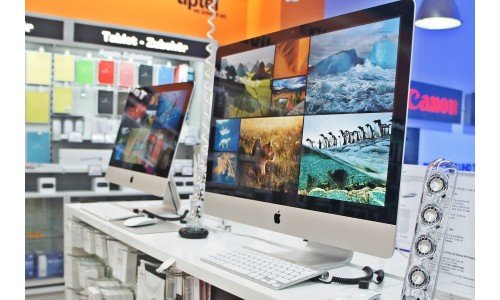1. Should you buy a desktop or laptop?
The first and most obvious aspect of computer shopping is: Should you buy a desktop or laptop? Although laptops are becoming a more popular option since many laptops are now comparable in performance to desktop computers, that doesn’t mean it's right for you.
Do need your computer when you travel? Are you taking it to school or business meetings? Or do you have a fixed workspace? If you’re typically only using your computer in one spot, you could save a bit of money and buy yourself a desktop. Surprisingly, if you compare a desktop and laptop will comparable performance features, the desktop will nearly always be cheaper! Many people think that since you’re getting a bigger computer when you buy a desktop you’ll be paying more, but that’s just not true.
If you’re typically working from home or at an office, consider buying a desktop and then take that money you saved and buy an inexpensive tablet to use for travel. Buying a used tablet is a great way to get the most bang for your buck!
2. Mac OS or Windows?
Almost as important as choosing desktop vs. laptop… Should you go with Windows or Mac? It’s all about personal preference here. Macs are simple and easy to use, and make life with an iPhone so much more convenient, but not all programs are compatible with Mac OS. If you’re planning to use any specific programs, make sure they’ll work on a Mac before taking the plunge into Apple brand computers.
3. What’s in a processor? Speed and Cores
If a fast computer is what you’re looking for, the processor is what you need to pay attention to. The processor is what helps you computer open program quickly and multitask without problems.
There are 2 factors the pay attention to when it comes to processors: speed and cores. Speed is labeled in gigahertz (GHz), this number typically ranges from about 1.5 to 3.3GHz. The number of cores basically multiplies the speed; a single-core 1.5GHz processor will be much slower than a quad-core 1.5GHz processor.
You’re using your computer the search the web or process documents, this isn’t something you should worry about. On the other hand, if you’re using your computer for things like video editing or gaming, you processor can make a big difference in the performance of your computer.
4. How much RAM do you need?
Measured in gigabytes (GB) RAM, which stands for Random Access Memory, is what helps your computer run smoothly when you’re multitasking. There is only so much information that your computer can have on hand at one time before it has to look through the slower hard drive. The more RAM your computer has, the easier it will be to multitask, if you tend to open multiple internet windows, you’ll definitely notice a difference with more RAM.
5. What type of hard drive will be best?
Your hard drive is what will help your computer start up more quickly and open programs in a snap. There are 2 types of hard drives, HHD and SSD, generally SSD are more popular in laptop computers due to the fact that they can withstand being moved around. Learn more about the difference between HDD and SSD.
6. Which inputs and drives do you use?
What are you plugging in or inserting into your computer on a regular basis? You may not care about having a DVD drive, but a SD card slot would be life-saver if you’re into photography! If you’re going to be connecting your computer to a TV look for one with a HDMI output. Think about how you’ll be using your new computer—you can always buy an external SD card reader or additional USB ports, but it’s always nice if you can find a computer with everything you need!
7. What should you do with your old computer?
So you don’t what to keep your old computer when you get a new one, what do you do with it? Never throw an old computer the trash, both laptops and desktops contain elements that are hazardous to the environment, if your computer doesn’t work anymore, recycle it instead! There are many places that accept recycled computers, check out Earth911 to find a computer recycling center in your area.
If you’re computer is still in working condition, sell it! Making a little money off of your unused electronics is always nice. Before you sell any computer make sure you erase everything off your computer—check out how to completely clear your MacBook before selling it. Once you’ve got your computer ready to sell, look for places to sell your Macbook or PC.
